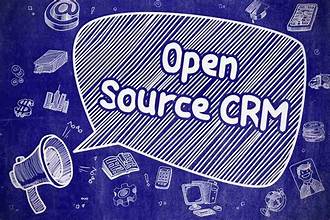Dive into the realm of Open Source CRM, where innovation meets customer relationship management. Discover the ins and outs of this dynamic software through a journey of features, customization, and community support.
Introduction to Open Source CRM
Open Source CRM software refers to customer relationship management systems that are developed and distributed with an open-source license. This means that the source code is freely available to the public, allowing users to modify and customize the software according to their specific needs.
There are several benefits to using Open Source CRM, including cost-effectiveness, flexibility, and a vibrant community of developers who continuously improve and enhance the software. Organizations can also avoid vendor lock-in and have more control over their CRM system.
Popular Open Source CRM Options
- 1. SuiteCRM: A powerful open-source CRM platform that offers a wide range of features for managing customer relationships, sales, and marketing.
- 2. SugarCRM: Another popular open-source CRM solution known for its user-friendly interface and scalability.
- 3. Vtiger CRM: This open-source CRM software is designed to help businesses streamline their sales processes and improve customer engagement.
- 4. Odoo CRM: An all-in-one open-source business management software that includes CRM functionality along with other modules like accounting and project management.
Features of Open Source CRM
Open Source CRM systems come with a variety of features that are essential for effective customer relationship management. Let's explore some key features commonly found in Open Source CRM software and how they compare to proprietary CRM systems.
Customization and Flexibility
Open Source CRM platforms offer extensive customization options, allowing businesses to tailor the system to their specific needs. Users can modify the software to match their unique processes and workflows, resulting in a more personalized CRM solution. In contrast, proprietary CRM software often comes with limitations on customization, restricting users to predefined settings and configurations.
Cost-Effectiveness
One of the major advantages of Open Source CRM is its cost-effectiveness. Since the software is free to use and modify, businesses can save on licensing fees and reduce overall expenses. On the other hand, proprietary CRM systems require upfront costs and ongoing subscription fees, making them more expensive in the long run.
Community Support and Updates
Open Source CRM benefits from a large community of developers and users who contribute to ongoing improvements and updates. This collaborative environment ensures that the software remains up-to-date with the latest trends and technologies. In contrast, proprietary CRM software may rely solely on the vendor for updates, which can lead to delays and limited support options.
Integration Capabilities
Open Source CRM systems are known for their integration capabilities, allowing seamless connections with other business tools and applications. This interoperability enhances workflow efficiency and data management across different platforms. Proprietary CRM software, on the other hand, may have limited integration options, resulting in siloed data and disjointed processes.
Scalability and Growth
Open Source CRM solutions are highly scalable, accommodating the needs of businesses of all sizes. Whether a company is a small startup or a large enterprise, Open Source CRM can scale to support growth and expansion. In comparison, proprietary CRM systems may have restrictions on scalability, making it challenging for businesses to adapt to changing requirements.
Data Security and Privacy
Open Source CRM software prioritizes data security and privacy, offering advanced encryption and access control features to protect sensitive information. Businesses have greater control over their data and can implement additional security measures as needed. While proprietary CRM systems also focus on security, the level of customization and control may be limited compared to Open Source alternatives.
Implementation and Deployment
Implementing and deploying Open Source CRM software in an organization is crucial for streamlining business processes and improving customer relationships. Below are steps for setting up Open Source CRM on different operating systems and best practices for successful deployment.
Setting up Open Source CRM
- Choose the right Open Source CRM software based on your organization's needs and requirements.
- Download the software from the official website or repository.
- Follow the installation instructions provided by the software provider.
- Configure the CRM system according to your organization's structure and workflow.
Deploying Open Source CRM
- Plan the deployment process carefully, considering factors such as data migration, user training, and system integration.
- Assign a dedicated team to oversee the deployment process and ensure smooth implementation
.
- Conduct thorough testing to identify and resolve any issues before full deployment.
- Train employees on how to use the CRM system effectively to maximize its benefits.
Remember to regularly update the Open Source CRM software to ensure security and performance improvements.
Customization and Integration
Customization plays a crucial role in Open Source CRM as it allows businesses to tailor the CRM system to meet their specific needs and requirements. By customizing the CRM, companies can enhance user experience, improve efficiency, and align the system with their unique business processes.
Examples of Customization in Open Source CRM
- Customizing data fields: Businesses can add, remove, or modify data fields to capture the information that is most relevant to their operations.
- Creating custom modules: Companies can develop custom modules to address specific business functions or workflows that are not covered by standard CRM features.
- Designing personalized dashboards: Users can customize their dashboards to display key metrics, reports, and data that are essential for their roles.
Integrating Open Source CRM with Other Tools and Systems
Integrating Open Source CRM with other tools and systems is essential for maximizing its effectiveness and ensuring seamless data flow across different platforms. Businesses can integrate their CRM with various applications such as marketing automation software, email marketing tools, accounting systems, and e-commerce platforms.
- API integration: Open Source CRM systems often provide APIs that allow for easy integration with third-party applications, enabling businesses to synchronize data and streamline processes.
- Automated workflows: Integration with workflow automation tools can help businesses automate repetitive tasks, improve collaboration, and enhance productivity.
- Bi-directional synchronization: By setting up bi-directional synchronization between CRM and other systems, businesses can ensure that data is consistent and up-to-date across all platforms.
Community Support and Updates
Community support plays a crucial role in the development and sustainability of Open Source CRM projects. Let's delve into how this support system operates and the benefits it brings to users.
Role of Community Support
- Community support in Open Source CRM projects involves a network of developers, users, and enthusiasts who collaborate to provide assistance, share knowledge, and solve issues.
- Users can access forums, online communities, and documentation to seek help, troubleshoot problems, and exchange ideas with others using the CRM software.
- Contributions from the community can range from answering queries and providing tutorials to developing plugins, extensions, and customizations for the CRM platform.
Management of Updates and Patches
- Updates and patches in Open Source CRM projects are typically managed through version control systems like Git, which allow developers to track changes, merge contributions, and release new versions of the software.
- Developers collaborate to identify bugs, security vulnerabilities, and performance issues, then work together to develop and test fixes before releasing updates to the community.
- Users can easily download and install updates, ensuring that their CRM software remains secure, efficient, and up-to-date with the latest features and improvements.
Benefits of Active Community Participation
- Being part of an active Open Source CRM community enables users to access a wealth of resources, including tutorials, user guides, and best practices shared by experienced members.
- Users can benefit from peer-to-peer support, where they can learn from others' experiences, get feedback on their implementations, and discover new ways to optimize their use of the CRM software.
- Active community participation fosters a sense of belonging, collaboration, and innovation, as users contribute their knowledge, skills, and ideas to the collective growth and evolution of the CRM platform.
Security and Data Privacy
In today's digital age, security and data privacy are paramount concerns for organizations using any CRM system, including Open Source CRM solutions. Ensuring the protection of sensitive information and compliance with regulations is crucial for maintaining trust with customers and stakeholders.
Data Encryption and Access Control
- Implement robust data encryption mechanisms to safeguard information stored in the CRM system.
- Set up strict access controls to limit who can view, edit, and delete data within the CRM platform.
- Regularly audit user permissions and review access logs to identify and address any potential security breaches.
Regular Software Updates
- Stay up-to-date with the latest security patches and software updates for the Open Source CRM system.
- Regularly monitor security advisories and announcements from the CRM community to address any vulnerabilities promptly.
- Consider implementing an automated update process to ensure that the CRM system is always running the latest secure version.
Compliance with Data Protection Regulations
- Ensure that the Open Source CRM system complies with data protection regulations such as GDPR, HIPAA, or CCPA, depending on the industry and location of the organization.
- Review and update privacy policies, data processing agreements, and consent mechanisms to align with regulatory requirements.
- Educate employees on data protection best practices and provide training on handling sensitive information within the CRM system.
End of Discussion
In conclusion, Open Source CRM offers a world of possibilities for businesses looking to enhance their customer relationships. With customization options, strong community support, and robust security measures, it's a versatile solution for modern enterprises.
General Inquiries
What is Open Source CRM software?
Open Source CRM software is a customer relationship management system that is open for modification and redistribution by users.
How does customization play a role in Open Source CRM?
Customization in Open Source CRM allows businesses to tailor the software to their specific needs, ensuring optimal functionality.
What are some popular Open Source CRM options available?
Some popular Open Source CRM options include SuiteCRM, Vtiger CRM, and SugarCRM.
How are updates and patches managed in Open Source CRM projects?
Updates and patches in Open Source CRM projects are often managed by the community, ensuring continuous development and improvement.
What are the benefits of being part of an active Open Source CRM community?
Being part of an active Open Source CRM community provides access to support, resources, and collaborative opportunities for software enhancement.






